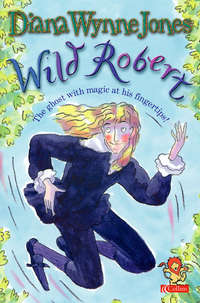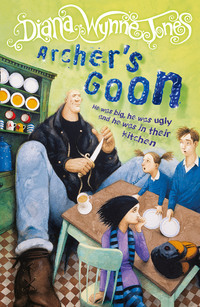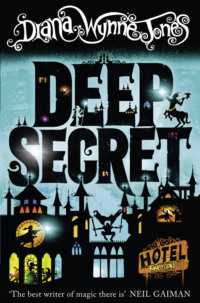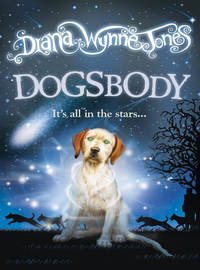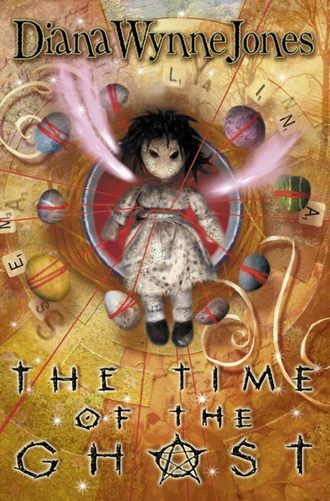
Полная версия
The Time of the Ghost
“You could win a screaming competition,” Fenella suggested. “Except that I’d beat you.”
“You little—” Imogen turned on Fenella, at a loss for words. “You Thing! And why are you wearing that green sack? It looks terrible!”
“I made her that green sack,” Charlotte said, advancing on Imogen and looming a little. And so she had, Sally remembered. Fenella’s clothes had been handed down three people before they reached Fenella, and they had all fallen to pieces. It was a pity, Sally thought, looking at the sack, that Cart was so very bad at sewing. It was not even a straight green sack. It puckered one side and drooped the other. The neck sort of looped over Fenella’s skinny chest.
Imogen realised her mistake and tried to apologise. “It was only an insult,” she explained, “chosen at random to express my feelings. I was thinking about my musical career.”
Which was typical Imogen, Sally thought, in the dim, remembering way she had been noticing everything so far. Imogen had set her heart on being a concert pianist. Very little else mattered to her. Sally looked at Imogen. Imogen, like Charlotte, was tall and fair, but, unlike Cart, Imogen was an unblurred version of Phyllis and very pretty indeed. This was unfair on Cart and Fenella, and unfair on Sally too, because Imogen was bigger and cleverer than Sally, and over a year younger.
What a hateful family I’ve got! Sally thought suddenly. Why did I come back here?
Oliver meanwhile, seeing that nobody noticed him, passed his great nose gently over the table. The butter was coaxed from under the newspaper, deftly magnetised, and slid away inside Oliver. This seemed to help Oliver get over the phenomenon of Sally a little. He advanced towards her, trembling a little, whining slightly, and gingerly swishing his tail.
“What is the matter with that dog?” said Imogen.
“We don’t know,” said Fenella.
All three of Sally’s sisters stared at her, and not one of them saw her.
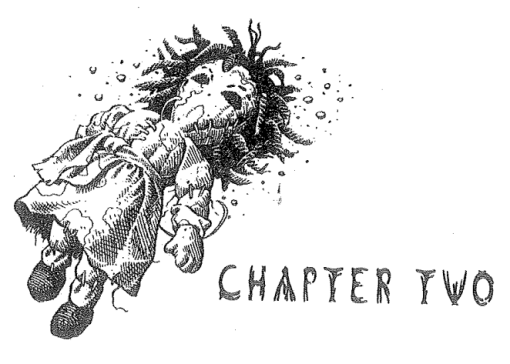
Their name was Melford, Sally suddenly remembered. They were Charlotte, Selina, Imogen and Fenella Melford. But she still did not know what she was doing here in this state.
Perhaps I came back here to get revenged, she thought.
It was rather a horrible thought and one, Sally hoped, that would not have come to her in the ordinary way. But no one could deny that this was not the ordinary way. They were all three looking at her and she hated them all: big formless Cart in that babyish blue dress, and self-centred Imogen – it was a mark of Imogen’s character, it seemed to Sally, that Imogen had somehow got hold of a bright yellow trouser suit which would have fitted Cart better. On Imogen, it was so large that the top half hung in downward folds like a curtain, and the bottom half was in crosswise folds like two yellow concertinas. Imogen had great trouble in not treading on the ends of the trousers all the time. And she had evidently felt the suit needed brightening up. She was wearing mauve plastic beads and orange lipstick. As for Fenella, Sally thought angrily, she looked just like the little Thing Imogen had called her. Those knob-knees were like joints in the legs of insects, and for antennae she had those two knots of her hair.
I hate them so much I’ve come back to haunt them, Sally decided.
At that, the whirl of misty notions – which was all Sally’s nonexistent head seemed able to hold – took a sharp turn in the opposite direction and almost stopped. This is a dream after all, she told herself tremulously.
But was it? Where had Sally come back from, after all? She had no idea, except that there had been some kind of accident.
Oh good gracious, am I dead? Sally cried out. I’m not dead, am I? she asked her sisters.
It did no good. Unaware that anyone was asking them anything, they all went back to their own concerns. Then all at once it became very important to Sally that they should know she was there. It was even more important to her than the reason why she was here. She was sure at least one of them could explain everything, if only they knew she was here to be explained to.
Tenella! she shouted. Fenella, after all, had almost known she was there.
But Fenella climbed from the draining board, through the open window, and jumped down outside. Sally fluttered after her, towards the sink. Oliver followed, whining uneasily, but gave up with a huge sigh when Sally sailed away through the window after Fenella.
Fenella was walking this way and that through the orchard when Sally caught up with her. She seemed to be making sure nobody else was there.
There is someone, Sally said, coming to a halt in a clump of nettles in front of Fenella. Look! There’s me.
Fenella walked straight past her, frowning. Fenella’s frown was the one thing about her that was like Phyllis. It gave Fenella the angel look too – a fallen angel. “Weaving spiders come not near,” Fenella said to the air beyond Sally and walked on. She came to the hut made of old chairs and knelt down in front of the opening in the soggy carpet. At once, she became a large-fronted dwarf again, with spindly arms. The spindly arms stretched towards the hut. “Come forth, Monigan. Come forth and meet thy worshipper,” Fenella intoned. “Thy worshipper kneeleth here with both arms outstretched. Come forth! She never does come forth, you know,” she remarked to the air above Sally.
I know, Sally said impatiently. The Monigan game had gone on far too long, it seemed to her. She knew she had thought it was pretty boring when Cart first invented the Worship of Monigan a year ago. Fenella, listen, look! Notice me!
“Monigan, thou hast but one worshipper these days,” Fenella intoned, unheeding. “Thou hadst better look out, Monigan, or I shall go away too. Then where wouldst thou be? Come forth, I say to thee. Come forth!”
Fenella! Please! said Sally.
But Fenella simply swayed around on her knees, intoning. “Come forth! Monigan, thou mightst do me a favour and come forth just this once. Canst thou not understand how boring thou art, just sitting there? Come forth!”
It would teach you if she did! Sally said, unheard and soundless. Then she had an idea. If she could flip a latch and barge a door, she might be able to move something as light as a rag doll, if she tried very hard. Fenella would notice that at least. Sally drifted to the hut and ducked in through the old carpet.
She only had the part of her that seemed to be head and shoulders inside it, but even that was almost too much. It was dank and stifling in there. And it smelt. Sally had a moment’s wonder that she should mind a smell so much, when she seemed to have no real nose to smell with. But I can hear and see too, she thought. Mostly what I can’t do is feel. She could not feel the sopping carpet, though she could smell the mildew on it, and smell Monigan herself, leaning soggily against the table leg at the back of the hut. There was a sharp mushroom smell from the pale yellow grass. But the worst smell came from the four or five little dishes in front of Monigan. The stuff was too rotten for Sally to tell what it had once been, but it smelt worse than the school kitchen. In front of the dolls’ plates, someone had carefully planted three black feathers upright in the pale grass.
Hm, said Sally. I wonder if Fenella is the only worshipper. Or did she do that?
She leant further in to push Monigan. She did not want to in the least. Monigan was hideous. A year in the wet hut had turned the rag face livid grey, and fungus had puckered it until it looked like a maggot. The rest of Monigan was misshapen before she went into the hut. One time, Cart, Sally, Imogen and Fenella had each seized an arm or a leg – Sally could not remember whether it had been a quarrel or a silly game – and pulled until Monigan came to pieces. Then Cart, in terrible guilt, had sewed her together again, as badly as she had sewed Fenella’s green sack, and dressed her in a pink knitted doll’s dress. The dress was now maggot grey. To make it up to Monigan for being torn apart, Cart had invented the Worship of Monigan.
Sally did not like to go near Monigan, but she made one halfhearted attempt to push her. But she had forgotten how a rag doll, sitting in the wet, soaks up moisture like a sponge. Monigan was too heavy to move. Gladly, Sally came up out of the hut. It was unbearable in there.
“I shall go and check the hens now,” Fenella remarked to the air, as Sally emerged.
No – notice me first! Sally cried out.
Fenella simply unfolded her insect legs and went wandering off. “Spotted snakes with double tongue,” Sally heard her say. “I wonder, do goddesses know how boring they are?”
Sally left her to it and went to find Cart or Imogen. They were both in the living room. Sally drifted in there, with Oliver anxiously trudging behind her.
“Can’t you play this piano?” Cart was saying. She had one hand keeping her place in her book and the other vaguely pointing to the old upright piano against the wall.
Imogen and Sally both looked at the piano, Imogen with contempt, Sally as if she had never seen it before. It was a cheap, yellowish colour and very battered. Its yellow keys looked like bad teeth. Sally could see nobody ever used it because of the heaps of papers, books and magazines all over it. There was a box of paints on the bass end, with a paste pot full of painty water balanced crookedly among the black notes. A painting was propped on the yellow music-stand – a surprisingly good painting of Fenella standing in a blackberry bush. Sally wondered who had done it.
“Play that!” Imogen said contemptuously. “I’d rather play a xylophone compounded of dead men’s bones!” She collapsed her full yellow length on a dirty sofa, which gave off a loud twang of springs as she landed. “My career is in ruins,” she said. “Was Myra Hess ever tormented in this way? I think not.”
Why does she talk like a book all the time? Sally wondered irritably. Cart seemed busy with her reading again. Since there seemed little chance of either of them noticing her, Sally roosted dejectedly on the back of an armchair. Oliver, seeing her settled, flopped down himself with a deep groan and lay like a heaped up hearthrug. But he was not asleep. Every so often he whined and turned one morbid eye in Sally’s direction.
“What’s wrong with him?” said Cart, looking up. Her blurry look was stronger when she was reading. It was as if she had faded into her book.
“His lunch, probably,” said Imogen. “You’re always fussing about that wretched animal.”
“Well, he’s my dog – or supposed to be,” said Cart. “I show a natural concern.”
“You show total, besotted devotion,” declared Imogen.
“I don’t! Why do you talk like a book all the time?” retorted Cart.
“It’s you that does that,” said Imogen. “You’re a walking dictionary.”
Cart went back to her book. Imogen stared stormily at the yellow piano. Sally tried to muster courage to attract their attention. She knew why she could not. They were both bigger than she was. Though why it should matter to me in this state, I can’t imagine, she said to herself.
Cart looked up again. “Isn’t it peaceful? I suppose it’s because the boys are in lessons. It’s hard on them breaking up a week after us, isn’t it?”
“No,” said Imogen. “I could use the music room if School term was over.”
“No you couldn’t,” said Cart. “Mrs Gill told me there’s a Course for Disturbed Children as soon as term ends. They’re coming to overrun the place on Tuesday.”
“Oh my Lord!” Imogen looked up at the ceiling and twiddled her mauve beads, faster and faster, so that they clattered viciously. “I hate the way we never get any holidays! It’s not fair!”
Oh, thought Sally. Her bodiless mind became clearer. Her parents kept a school – or rather, she seemed to think, they kept School House of a large boys’ boarding school. Yes, that was it. The girls went to quite a different school, some miles away. Oh dear! said Sally. She had been very silly looking for her class in the boys’ school. She was glad no one had known. Why had she not remembered she had broken up already? Because she had lived in the boys’ school all her life, she supposed, and it was much more real to her than her own. And Cart had supplied another memory: School was never empty. Almost as soon as the boys went home, more children came for courses. There were, as Imogen said, never any holidays.
Next second, Sally found herself jumping to attention. Her movement made Oliver raise his head and rumble unhappily. Cart said, “I feel really envious of Sally – a horrible yellow envy, like the colour of that piano. Why did we agree it should be her? Why Sally?”
“That’s why it’s so quiet, of course,” said Imogen.
“So it is!” said Cart, sitting forward as if Imogen had made a truly exciting discovery. “No whining and grumbling.”
“No arguing and quarrelling,” agreed Imogen, stretching as if she was suddenly very comfortable. “No stream of remarks about squalor. No tidying up.”
“No hysterics and crashing about,” said Cart. “No criticisms. I sometimes feel I could bear all the rest of Sally if she wasn’t always going on about the way we speak and walk and dress and so on.”
“The thing about her that really annoys me,” said Imogen, “is her beastly career, and the way she’s always on about it. She’s not the only one with a career to think of.”
There was a slight pause. “Well – no,” said Cart.
Sally looked from one to the other, wondering which she hated most. She had just decided it was Imogen, when Cart started again.
“No – it’s Sally’s pose of being good and sweet that drives me up the wall, now I think. And, if I venture the slightest criticism of Phyllis or Himself, she springs to their defence. She can’t seem to believe they’re not the most perfect parents anyone could have.”
Well, I think they are! Sally shouted. Neither of them heard her. Without question, it was Cart she hated most.
“That’s not quite fair, Cart,” Imogen said. She exuded justice and fair-mindedness. Sally remembered she always wanted to hit Imogen when she went like this. “Sally,” Imogen explained seriously, “truly does think this family is perfect. She loves her father and mother, Cart.”
Imogen’s saintly tone maddened Cart as well as Sally. Cart’s large face took on a blur of pink. Her eyes glared like holes in a mask. She roared, louder than Fenella, so that the windows buzzed, “Don’t you give me that nonsense!” and flung herself at Imogen. Oliver saw her coming just in time and lumbered to his feet to get out of the way. But Imogen, with the speed of long practice, catapulted off the sofa in front of him. Oliver was forced towards Sally, and he did not like that. He growled. But he also wagged his tail and lowered his head in Sally’s direction as he growled, because he could not understand what made her so peculiar.
Imogen and Cart took no notice. They dodged round Oliver, howling insults. And Sally forgot this was not the usual threesome quarrel and screamed unheard insults also. Talk about arguing and quarrelling! Talk about hysterics! And you can talk about careers, Imogen! How dare you criticise me behind my back!
“I think Oliver’s gone mad at last,” Fenella’s largest voice boomed behind them. Fenella was standing in the doorway, looking portentous.
Cart and Imogen – and Sally too – looked at the growling, wagging Oliver. “Well, he never did have any brain,” Imogen said.
“There really is something wrong with him, I think,” Cart said anxiously.
“I’ll tell you something else wrong,” said Fenella. “The black hen is still missing. I counted all the hens and looked everywhere. It’s gone.”
“There must be a fox,” said Cart. “I told you.”
“I didn’t mean that,” Fenella said meaningly.
“Then what did you mean?” said Cart.
Imogen said, “Cart, she’s tied her hair in knots. Look.”
Fenella dismissed this with magnificent scorn. “Of course Cart knows. It’s all part of the Plan.” Imogen, at this, looked surprisingly humble. “I meant the hen and Oliver.”
“You mean Oliver’s eaten it!” Cart exclaimed. She rushed to Oliver and tried anxiously to open his mouth. This was impossible. Oliver, as well as being very large, very strong and utterly thick, was also rather more obstinate than a donkey. He never did anything he did not want to, and he did not want his mouth open just then.
“I don’t think you’d be able to see the hen, even down Oliver,” Imogen objected.
“But he might have feathers on his teeth,” Cart gasped, wrenching at Oliver’s muzzle. It could have held two hens easily. “Think of the row there’ll be!”
“Then it’s better not to know,” said Imogen.
“If you’re ready to listen to me – I didn’t mean that,” Fenella said, and, still very portentous, she turned in a swirl of crooked green sack and marched away.
“Then what was it about?” Cart said to Imogen.
Imogen spread her hands. “Fenella being Fenella.” She raised her hands to the ceiling. “Oh why am I cursed with sisters?”
“You’re not the only one!” snarled Cart.
Sally left them beginning another quarrel and drifted miserably out into the orchard. The hens, like Oliver, seemed to know she was there. They were all gathered pecking at some corn near the gate, which Fenella must have put down so that she could count them, but they ran away chanking and squawking as Sally floated through the bars of the gate. Sally stared after their striding yellow legs and the brown sprays of tail-feathers jerking away from her in the grass. Silly things. But, as far as she could tell, the black one was indeed missing. She felt she ought to have known. She knew those hens as well as she knew her sisters.
That was the funny thing about being disembodied. Her mind did not seem to know anything properly until she was shown it. Drifting in and out among the trees, where hundreds of little pointed green apples lurked under the broad leaves, Sally tried to recall all the things she had been shown. Somewhere, surely, she must have been given a clue to what had made her like this – an inkling of what had happened at least. Well, she knew she lived in a school. She had three horrible sisters, who thought she was horrible too – or two of them did. Here, Sally broke off to argue passionately with the air.
I’m not like that! I’m not hysterical and I don’t go on about my career. I’m not like Imogen. They’re just seeing their own faults in me! And I don’t grumble and criticise. I’m ever so meek and lowly really – sort of gentle and dazed and puzzled about life. It’s just that I’ve got standards. And I do think Mother and Himself are perfect. I just know they are. So there!
But before all that started, hadn’t Cart shown that she and Imogen knew where Sally was supposed to be? They had. Cart had envied Sally – envied! That was rich! They were certainly not worried about her – but that proved nothing. Sally could not see either of those two worrying about anyone but themselves. But if Cart envied her, why should Sally have this feeling that there had been an accident? A mistake – something had gone wrong – there had been an accident—
Before Sally was aware, the balloon of panic had blown itself up inside her again. She whirled away on it, tumbling and rolling …
When at last it subsided, she found herself drifting along the paths of a slightly unkempt kitchen garden. She gave a shiver of guilt. This too was a forbidden place. There was, she remembered, a perfectly beastly gardener called Mr McLaggan, who hit you unpleasantly hard if he caught you, and shouted a lot whether he caught you or not. All the same, as she drifted past a hedge of gooseberry bushes, Sally had a firm impression that she and the others often came here, in spite of Mr McLaggan. Those same bushes, where a big red gooseberry or so still lingered among the white spines, had been raided when the gooseberries were apple green and not much larger than peas. And they had picked raspberries too, in a raid with the boys.
Sally saw Mr McLaggan down the end of a path, hoeing fiercely, and prudently drifted away through a brick wall. There was a wide green playing field on the other side of the wall. Very distantly, small white figures were engaged in the ceremony of cricket.
I think, Sally said uncertainly, I think I like watching cricket.
But it made you very shy, she remembered, being one girl out in the middle of a field full of boys. They stared and said to one another, “That’s Slimy Semolina, that girl.” Some said it to your face. And being boys, they were of course quite unable to tell you and your sisters apart, and called all four of you Slimy Semolina impartially. But now, when she was in the ideal state for not being noticed, Sally somehow could not face all that wide green space. She was afraid she would dissolve to nothing in it. There was little enough of her left as it was. She kept along beside the wall and the buildings, past an open cycle shed, across a square of asphalt with nets for basketball at either end, and – quickly – beside a row of tennis courts. Here, the balls sleepily went phut-phut. The ones in white, playing tennis, were all from the top of the school, who looked and spoke exactly like men. It was unnatural, somehow, that they should be schoolboys, when you could not tell them from masters. They alarmed Sally too, when they suddenly broke into bellows of deep laughter. She always thought they were laughing at her. This time when they did it, she imagined them saying, “Look at that girl – got nothing on – not even her body! Ha-ha-ha! Oh ha!”
Ha-ha to you! Sally said angrily, speeding past. I can’t help it!
Of course, she thought – it was as if embarrassment had churned up new ideas – this was probably only a dream. But just in case it was real, Mother and Himself would know what to do. Mother had really, very nearly, seen her by the green door. She need only wait until school was over for the day and they would be able to tell her what had happened. Probably everybody knows except me, Sally said, with the pricking of not-real tears in her nonexistent eyes. I’m always left out of things.
Almost at that moment, school was over for the afternoon. Sally found herself mixed, tumbled and swept back again, in a running grey crowd of boys. She was surrounded by laughing – “Did you listen to what Triggs said to Masham in Geography?” – and arguing – “No it isn’t! They have four-wheel drive!” – jeering – “Don’t give up, Peters! Just hit me and see what you get!” – and wordless fighting. BANG.
Ow! said Sally. I felt that!
It was very curious. She began to wonder if she had some kind of body after all. She had definitely been caught just then, between somebody’s fist and somebody else’s body. And it was as difficult to go forward against the crowd as it would have been in the ordinary way. Though Sally pushed and shoved, and expected with every push that she would go right through one of the chattering, running boys, she found that this was one thing she could not do. Each boy seemed to have, around his solid body, a warm elastic quivering field of life, which held Sally off. It was as thin as tissue paper, but it was there. Sally could feel it crackling faintly, every time she bumped against a boy.
That’s peculiar, she said. I wonder if all living things are like this. I must remember to try walking through a hen sometime. Oliver would have made a bigger target, but the idea of walking through Oliver was too alarming.
While Sally said this, the crowd of boys surged off past her and left her on her own, feeling strange and shaken. It was like being breathless – except that she had no breath to start with. She went on, round into the school garden beside the lime trees. More boys were coming out from under the lime trees and wandering about there. Sally hovered above the trampled earth, watching them. It was strange how few of them walked like human beings should. They went shambling, or knock-kneed, or with one shoulder up and the other down, and it almost seemed they did it deliberately. One boy was going up and down a space twenty feet long, walking with his toes digging into the earthy lawn and his knees giving gently. His jaw was hanging and he was muttering to himself. Every few steps, one of his knees bent sharply, as if he had no control over it.


